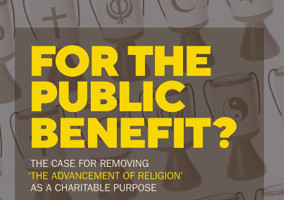Writing about the faith charity sector is fraught with difficulties, not least how to define them. Maybe it is appropriately enough a question of belief – it’s up to charities to decide whether or not they are part of the faith sector. Having said that, I suspect that they are in fact a microcosm of the overall charity sector with amazing diversity of size, age, purpose and role. There are also thousands of them – aside from the big names, virtually every mosque, temple, church or synagogue is a separate charity.
My intention here is to consider what some of the things are that make faith charities distinctive and how these challenge leaders and influence their behaviours, and hopefully to provide some useful insights for those in non-faith charities.
1. A higher calling?
The most obvious feature is that irrespective of which faith it is, all exist to some extent because of a belief in something that extends beyond humanity – a higher authority even than (whisper it!) the Charity Commission. This should result in a clarity of core purpose that transcends time and individual preferences, but also encourages a view that the current generation are stewards of resources with a responsibility for prudent management, protecting the future and working towards the common good.
Many leaders of faith charities are smiling and shaking their heads at this point, and part of that is because, as I’ve mentioned, most individual places of worship are separate charities, sometimes with voting members. Trustees may be elected by ballot, making it difficult to influence diversity or an appropriate mix of skills, but also they face a situation where existing members expect their own needs and preferences to be met. This conflicts with the need to change and adapt in order to reach out and fulfil both their mission, and their public benefit requirements. For treasurers and finance teams this can be a real challenge as they have to ensure that funds are used for genuinely charitable purposes as defined by the SORP; not the whim of a particularly vocal group.
Because of their faith, there can be a tendency for some staff or volunteers involved with faith charities to believe that they are in fact above its policies and procedures, or even the law of the land. Individual adherents of any faith may well find themselves having to weigh particular laws against their conscience, but they need to be able to separate their personal convictions from their responsibilities to a charity.
2. A long-term perspective
One of the biggest positives of the above points is that they have a very long-term view – both looking forwards and (sometimes unhelpfully) backwards. As many in the world continue to grapple with the impact of Covid-19 and charities themselves with its impact on their ability to meet growing levels of need, great comfort can be gained from organisations that have survived major catastrophes in the past and expect to continue serving a higher calling in perpetuity.
Although faith charities are not exempt from the challenges of bending their purpose to chase funding, or of the need to constantly reflect contemporary society, they can often demonstrate an independence of mind and constancy of purpose that isn’t affected by short-term situations or passing fads. Possibly this is one of the unseen challenges for their leaders – remaining faithful to that overriding calling, whilst regularly ensuring that strategies and activities align with the evolving needs of their beneficiaries.
Whilst it can be a challenge, particularly if inertia and complacency set in, this longevity should be a real gift from faith charities to the wider sector. Where many are worried about resources and the threat of unmanageable levels of demand, the stability of a long-term perspective and hope for the future should enrich and encourage others if expressed appropriately.
3. Great levels of personal commitment
The entire voluntary sector is driven by the commitment of many to serving others and meeting various social needs. However, the motivation of faith can be particularly strong and is often manifested in a tremendous sense of vocation that transcends most other considerations.
This can sometimes turn up in unexpected ways. I worked as a senior leader within the Methodist Church for 10 years and some of the most effective and valued members of my team were from other faith communities. They were particularly effective and committed because they understood the motivation of faith – why ordained ministers took it personally when they disagreed with a decision or why volunteers lamented that “this doesn’t feel like my church anymore”.
Faith brings a tremendous level of ownership and belonging which can influence outcomes, particularly with regard to finance. Most faiths include teaching and practice regarding charitable giving, making income more resilient in the face of changing pressures – Islamic Relief has recently stated that it had a “record” Ramadan this year, raising 30% more than in 2019 despite the appeal taking place during lockdown, which prevented visits to mosques or other gatherings where giving in person was likely.
The downside of this commitment can be a tendency towards distracting arguments over strongly held dogmatic views. July’s Charity Finance magazine covered the Methodist Church’s divestment from four oil companies, including BP. Its own investment manager, the Methodist Central Finance Board, is a strong advocate of shareholder engagement, arguing that wholesale divestment will simply lead to shares belonging to investors with no ethical stance, removing pressure to change and reform. It has spent two years researching the oil industry in great depth, using a wide range of criteria to assess the extent to which each company was committed to addressing the climate emergency. For now it continues to hold shares in and engage with Royal Dutch Shell, but no matter how that company changes its behaviour, it could still be forced to sell by campaigners within the church.
4.Everyone is nice (but not always kind)
Irrespective of how successfully their actions sometimes demonstrate it, faiths tend to assert the intrinsic value of human life. The positive aspects of this can be seen in widespread humanitarian work and campaigning, and generally a commitment to serve and empower those facing various types of deprivation or discrimination. Many grassroots services are provided by faith communities whose combination of property ownership and volunteers enables them to work efficiently and effectively. In the town where I live, the Trussell Trust foodbank is led by one church, with others hosting distribution points around the town and all of them providing donations, and a mosque facilitating an excellent and invaluable community fridge within its property.
However, if charities overall have a tendency to spread themselves too thin, the faith sub-sector takes that to extremes. If everyone is important and of value, how do you say no to them? Helping keen volunteers and staff to see that just because everything is important, that doesn’t mean your particular charity has to do them all itself, is a key skill for leaders in all faith charities.
Approaches to line management within faith charities can be particularly difficult, with many interpreting the need to be “fair” and to value everyone as effectively meaning poorly performing staff must be tolerated. Holding people to account is frowned upon and formal reviews are a definite no-no. I have never understood how it is respectful to leave someone that is floundering to suffer.
In my early months at the Methodist Church, I was called aside by a senior manager who “warned me” that an administrator that had been successfully redeployed into my team was “useless and difficult”. I was both taken aback and surprised based on their interview test results, so I allocated her to a two-person team working close to me. I soon learned that I had someone with incredible attention to detail and a great work ethic, but that needed to be given clear and rationally explained instructions to prevent them becoming visibly stressed and disruptive. I know that the previous manager had a good heart and wanted to be nice, but the truth is the administrator had no idea of his low opinion of her, and had become miserable and bored as he steered work away from her.
5. Faith isn't cool
The views and policies of governments and the sector in general have ebbed and flowed. It’s not that long ago that many faith groups set up “secular” charities because funders excluded them purely on the grounds of their beliefs. Those policies have gradually shifted, sometimes through a pragmatic acceptance that excluding a faith group simply meant the work would stop because there were no other community groups able to take over.
I also think the growing importance of Sikh, Muslim and Hindu charities, plus Black-led churches in the UK has forced change as local authorities and foundations have realised that actually the way that many BAME people contribute to society is via a charity that enables them to express their faith through serving others. Part of that is about not being ashamed of faith as a motivation, which some longer established churches had maybe slightly lost sight of.
Conclusion
The very nature of faith charities is that they stand for a particular set of beliefs and values, so inevitably there will be times when they may decide that their convictions prevent them from getting involved in particular work or accepting certain funding. Both the charities themselves and the rest of the sector need to acknowledge this and accept it not as a fault, but as part of their distinct identity.
More important is probably a commitment to be true to their identity and to contributing to the overall health and positive impact of the charity sector, particularly at such a time as this, when many in the UK and beyond face challenges that cannot be overcome without skilled, empowering and compassionate support – whether motivated by faith or not.
Related articles
Fadi Itani: Let's talk about Zakat and giving during Ramadan
Fadi Itani, chief executive of the Muslim Charities Forum, explains how Ramadan has become a time for increased market awareness and an opportunity to tap into the heightened social and spiritual conscious of the Muslim consumer.












